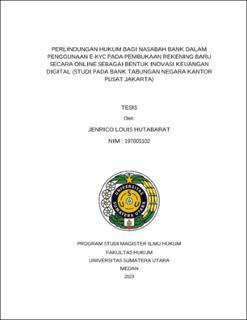| dc.contributor.advisor | Sunarmi | |
| dc.contributor.advisor | Sukarja, Detania | |
| dc.contributor.advisor | Andriati, Syarifah Lisa | |
| dc.contributor.author | Hutabarat, Jenrico Louis | |
| dc.date.accessioned | 2025-02-11T04:20:59Z | |
| dc.date.available | 2025-02-11T04:20:59Z | |
| dc.date.issued | 2023 | |
| dc.identifier.uri | https://repositori.usu.ac.id/handle/123456789/101086 | |
| dc.description.abstract | Financial Services Authority Regulation Number 23 /POJK.01/2019 stipulates
that Bank must verify the correctness of the identity of prospective customers through
face to face meetings with prospective customers at the beginning of a business
relationship in order to ensure the correctness of the identity of prospective
customers. The verification process through face to face meetings can be replaced by
verification through electronic means. There is a conflict between the principle of
knowing the customer and the right to privacy which should be bridged by the
protection of personal data. This research examines: (1) the function of E-KYC in the
implementation of banking services in Indonesia, (2) the Bank's legal responsibility in
protecting Customer Personal Data in connection with the practice of E-KYC and (3)
the form of protection of Customer Personal Data implemented by BTN Jakarta Head
Office in the practice of E-KYC.
This research uses descriptive analytical normative legal research with a
statutory approach method that examines the use of E-KYC in opening new accounts
using the BTN-Mobile application at BTN Jakarta Head Office. This research uses
data collection techniques by means of literature study and interviews and uses
qualitative data analysis.
The results of this study indicate that the practice of E-KYC is implemented with
the term Customer Due Dilligence (CDD) which applies to any activity in the form of
identification, verification and monitoring carried out by the verification Bank
through electronic means owned by the bank or owned by a third party. Banks as EKYC
providers must meet the aspects of security, interconnectivity and compatibility
with the systems used, have technical support services, maintenance and / or aftersales
from the seller or provider and have a guarantee of service sustainability so
that they can be registered as electronic system providers in the banking sector. If
these responsibilities are not carried out, the Bank will be sanctioned with a written
warning up to the revocation of business license. BTN Mobile electronic system has
been registered as an Electronic System Operator (PSE) in the domestic private
sphere. This is a concrete manifestation of Bank BTN's efforts to protect customer
data using the BTN Mobile electronic system, which uses international standard security technology. | en_US |
| dc.language.iso | id | en_US |
| dc.publisher | Universitas Sumatera Utara | en_US |
| dc.subject | E-KYC | en_US |
| dc.subject | BTN Mobile | en_US |
| dc.subject | Personal Data Protection | en_US |
| dc.title | Perlindungan Hukum Bagi Nasabah Bank dalam Penggunaan E-KYC pada Pembukaan Rekening Baru Secara Online sebagai Bentuk Inovasi Keuangan Digital (Studi pada Bank Tabungan Negara Kantor Pusat Jakarta) | en_US |
| dc.title.alternative | Legal Protection for Bank Customers in the Use of E-KYC in Opening New Accounts Online as a form of Digital Financial Innovation (Study at the Jakarta Head Office of the State Savings Bank) | en_US |
| dc.type | Thesis | en_US |
| dc.identifier.nim | NIM197005102 | |
| dc.identifier.nidn | NIDN0015026304 | |
| dc.identifier.nidn | NIDN0011098301 | |
| dc.identifier.nidn | NIDN0011098402 | |
| dc.identifier.kodeprodi | KODEPRODI74101#Ilmu Hukum | |
| dc.description.pages | 126 pages | en_US |
| dc.description.type | Tesis Magister | en_US |
| dc.subject.sdgs | SDGs 4. Quality Education | en_US |


